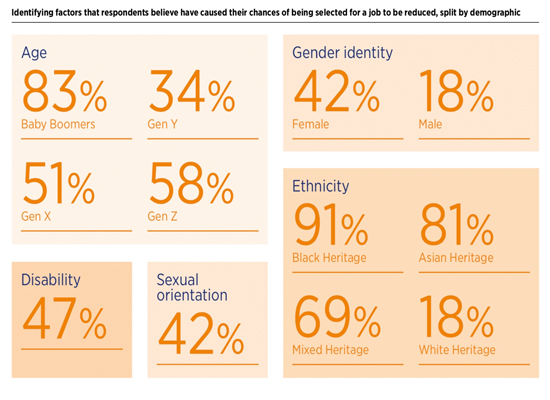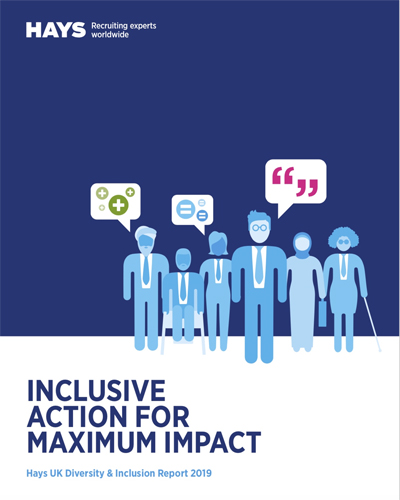Companies wanting to attract more diverse candidates need to show a clear commitment to diversity and inclusion (D&I), according to Hays Diversity & Inclusion Report 2019.
The global recruitment firm’s latest research reveals four key ways that organisations can level the playing field to attract more diversity. They include: eliminating language bias, promoting flexibility, and using blind recruitment and diverse interview panels in recruitment and selection processes.
Using unbiased language to describe vacancies and culture would have a positive impact on attracting diversity, according to the majority of professionals interviewed in the survey, yet only 55% of organisations do this. Even fewer companies (42%) have clearly defined, unbiased tone guidelines, the report reveals. Ensuring that a firm’s website or careers page accurately represents and effectively captures workplace culture is also important for 74% of professionals, particularly the majority of the younger generations. However, only 44% said that this was actually the case at their organisation.
“Our findings highlight a clear gap where employers are not appealing to a diverse talent pool when hiring. As so many candidates, particularly those new to the workforce, are looking for a clear commitment to diversity and inclusion from a potential employer, organisations are encouraged to take measures such as eliminating their language bias and promoting their commitment to fostering a diverse workplace via their website,” said Yvonne Smyth, Group Head of Equality, Diversity and Inclusion at Hays.

IDENTIFYING FACTORS
Given that ethnicity and age are two of the biggest limiting factors for job seekers, blind recruitment and diverse interview panels can go a long way to help to level the playing field, according to the report. In fact, over half (52%) of the professionals surveyed believe their chances of being selected for a job are lower because of an identifying factor, such as ethnicity, race or disability. More than 91% of professionals with Black heritage and 81% with Asian heritage believe their chances of being selected for a job are reduced because of their ethnicity, compared to just 18% of those with white British heritage.
Age is another significant barrier, according to the survey. Approximately 83% of those aged 55+ believe their chances of being selected for a job are restricted. Women are also more than twice as likely to feel that their chances of being hired are lower due to their gender identity, compared to men (42% and 18% respectively), as are members of the LGBTQ+ community (41%) and people with disabilities (37%).

BLIND RECRUITMENT PROCESSES
However, knowing that an employer uses blind recruitment in their selection process gives at least two-thirds of professionals more confidence that they will be fairly considered, the survey reveals. Approximately, 81% of people with Asian heritage and 75% of those with Black heritage feel more confident in an organisation that implements blind recruitment, as do 72% of females. Despite this, only 23% of organisations use blind recruitment techniques, according to the report.
Alongside blind recruitment, 78% of respondents believe introducing diverse interview panels would have a significant impact on the selection and hiring of diverse talent. Currently, only 43% of organisations implement this. A technique used more widely (by 66% of organisations) is a structured interview process, which almost four in five believe would have a positive impact on diverse hiring. Many organisations, however, fall down when it comes to adjusting tests and assessments to make them fair for candidates with disabilities. Although 82% think this would have a positive impact, less than half of those companies (45%) have adapted their assessments accordingly.
Finally, an overwhelming 86% of respondents believe that offering and promoting flexible working practices to prospective employees will have a positive impact on helping to attract more diverse talent, yet only 52% believe their employer offers and promotes this.
“It’s clear from our research that despite greater awareness of the impact of unconscious bias, most professionals still feel their chances of being chosen for a job have been hindered based on identifying factors, particularly when it comes to ethnicity,” added Smyth. “Our findings indicate that in order to address this, employers need to look at the beginning of their recruitment process and consider implementing blind recruitment techniques, as well as diversifying their interview panels.”

Click here for more information about the Hays Diversity & Inclusion Report 2019.








































